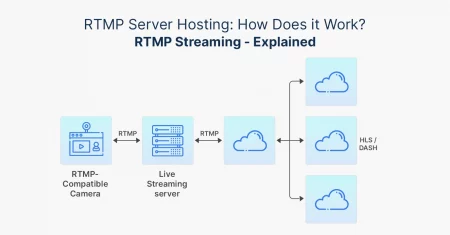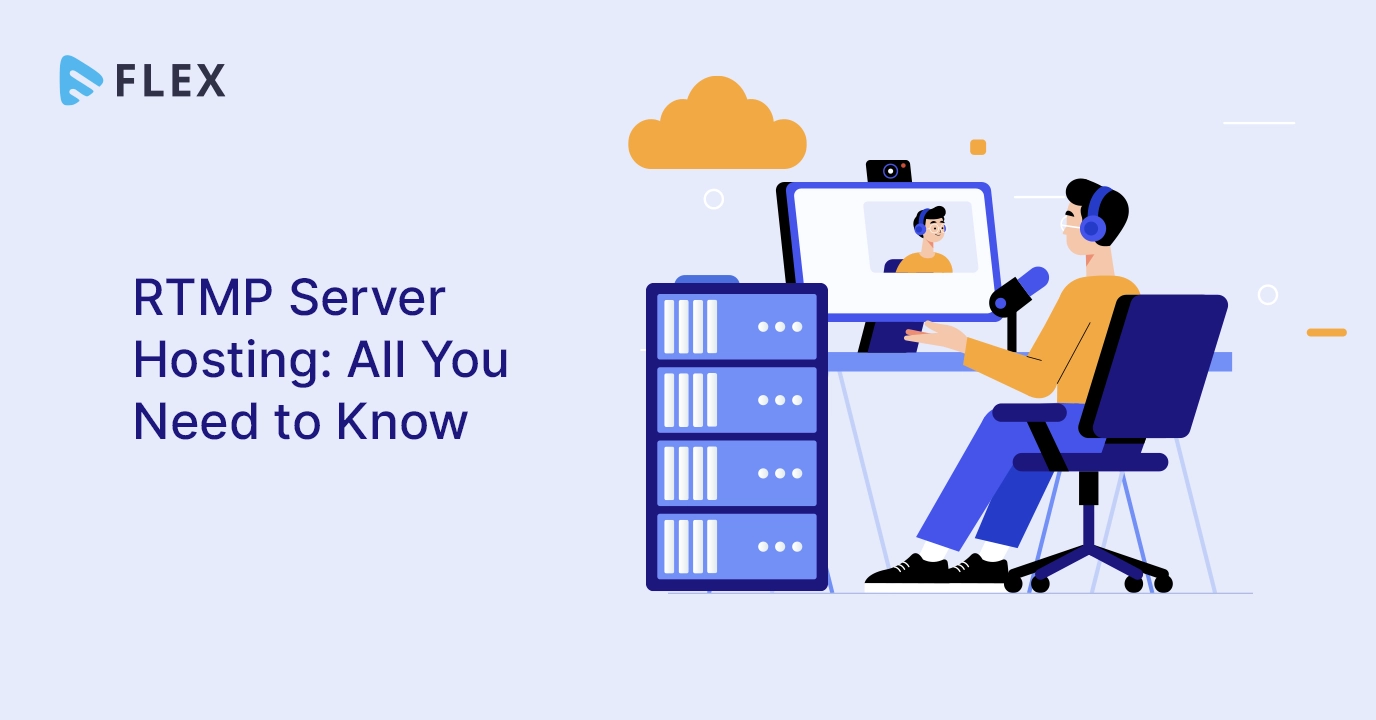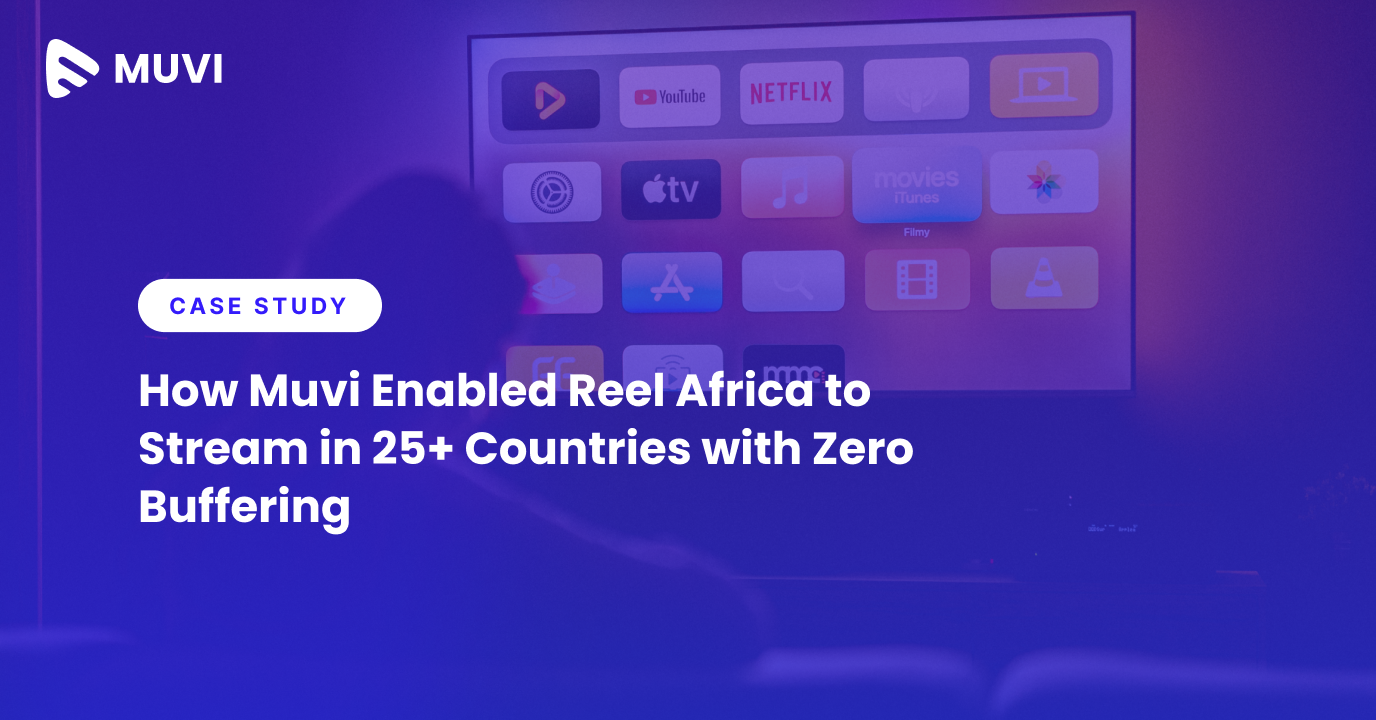It’s been a while since streaming has emerged as a powerful tool for content creators, businesses, and organizations alike.
With its ability to reach a vast global audience in real-time, streaming (both audio and video) has become an essential aspect of modern communication and entertainment. And RTMP Streaming has been at the forefront of enabling this change.
RTMP, or Real-Time Messaging Protocol, is a robust technology that enables high-quality streaming experiences by facilitating the transfer of audio, video, and other data in real time. It has emerged as the most popular streaming protocol and has been adapted by most leading streaming platforms, which in turn has enabled and is powering the creator economy as well as helping businesses meet their objectives by bringing the world closer.
In this blog, we will delve deeper into RTMP server hosting and explore how it can revolutionize your streaming business. So, let’s get started!
What Is RTMP Server Hosting?
RTMP server hosting refers to the deployment and utilization of a server that supports the Real-Time Messaging Protocol (RTMP) for streaming audio, video, and data in real time over the internet. RTMP is a protocol developed by Adobe Systems that enable the transmission of high-quality media content with low latency.
At its core, an RTMP server acts as a middleman between the content source (such as a live video stream) and the end-user devices. It receives the audio, video, or data stream from the content source and delivers it efficiently to the viewers’ devices, ensuring a smooth and uninterrupted streaming experience.
RTMP Server Hosting: How Does it Work?

RTMP server hosting is a crucial component for streaming media delivery, offering efficient transmission of audio, video, and data in real time over the internet. To understand how it works, let’s dive into the technical intricacies of this powerful protocol.
At the heart of RTMP server hosting is the Real-Time Messaging Protocol (RTMP), which is responsible for the transmission of multimedia content. RTMP utilizes a client-server model, where the client (usually a media player or encoder) connects to the RTMP server to transmit the data.
When a streaming session begins, the client establishes a connection with the RTMP server using the RTMP handshake protocol. This handshake ensures secure and reliable communication between the client and the server. Once the handshake is complete, the client can start sending the audio, video, or data stream to the server.
The RTMP server acts as a central hub, receiving the incoming media stream from the client and distributing it to the viewers’ devices. The server performs several crucial functions to optimize the streaming process:
- Encoding and Transcoding: The RTMP server performs encoding and transcoding tasks to convert the incoming media stream into a suitable format for delivery to different devices.
- Packetization: The server breaks down the media stream into smaller packets, allowing for efficient transmission over the internet. These packets typically include audio, video, and control data.
- Bandwidth Management: The RTMP server manages the bandwidth allocation for each viewer, ensuring a smooth streaming experience by dynamically adjusting the bitrate based on the viewer’s network conditions.
- Simultaneous Delivery: The server supports multicast or unicast delivery methods, enabling simultaneous distribution of the media stream to multiple viewers in real time.
- Playback Control: The RTMP server provides playback control features such as seeking, pausing, and resuming the stream. It keeps track of the playback state and allows viewers to interact with the content.
- Authentication and Security: The server also incorporates authentication mechanisms to ensure authorized access to the media content, protecting against unauthorized distribution or piracy.
Throughout the streaming session, the RTMP server continually monitors the connection, handling any potential disruptions and retransmitting lost or corrupted packets to maintain a seamless playback experience.

Why Is RTMP Server Hosting Crucial for Streaming Businesses?
Now let’s explore why RTMP server hosting is essential for streaming businesses and how it can revolutionize content delivery.
1. Low-Latency Real-Time Streaming
One of the primary advantages of RTMP server hosting is its ability to facilitate low-latency real-time streaming. Traditional streaming protocols often introduce noticeable delays between the content source and the viewer’s device, resulting in a disconnect between the live event and the viewer’s experience.
RTMP significantly reduces this latency, enabling broadcasters to deliver content in real-time, fostering a sense of immediacy, and enhancing viewer engagement. Whether it’s a live sports event, a concert, or an interactive webinar, low-latency streaming provided by RTMP server hosting ensures that viewers feel connected and immersed in the content.
2. Enhanced Streaming Quality and Reliability
RTMP server hosting empowers streaming businesses to maintain high-quality video and audio delivery, even in the face of varying network conditions and fluctuating viewer demands. By leveraging RTMP’s robust streaming capabilities, the server can adapt the bitrate dynamically, ensuring a smooth playback experience for viewers.
Additionally, the server’s ability to handle packet loss and retransmissions contribute to a reliable streaming experience, minimizing buffering and interruptions. With RTMP server hosting, streaming businesses can provide viewers with seamless and uninterrupted playback, elevating their satisfaction and reducing churn rates.
3. Flexibility in Content Distribution
RTMP server hosting offers streaming businesses the flexibility to distribute content to a wide range of devices and platforms. RTMP is widely supported by media players and devices, making it accessible across desktops, mobile devices, and smart TVs.
The protocol’s versatility allows streaming businesses to reach a broader audience, expand their market reach, and maximize their revenue potential. Whether it’s live streaming, on-demand content, or interactive applications, RTMP server hosting provides the necessary infrastructure to deliver content seamlessly across multiple platforms, catering to diverse viewer preferences and devices.
4. Interactivity and Engagement
Engaging viewers and fostering interactivity are crucial elements for streaming businesses to build a loyal and dedicated audience. RTMP server hosting enables the integration of interactive features such as live chat, real-time polls, and social media integration, facilitating direct engagement between the content creators and viewers.
This interactivity enhances the viewing experience, encourages audience participation, and builds a sense of community. Whether it’s a live Q&A session, audience voting during a talent show, or real-time comments during a gaming stream, RTMP server hosting empowers streaming businesses to create immersive and interactive experiences that captivate their audience.
5. Monetization Opportunities
For streaming businesses, monetization is a key driver of success. RTMP server hosting opens up various avenues for revenue generation. By implementing features such as pay-per-view events, subscriptions, or ad-supported content, streaming businesses can monetize their content effectively.
RTMP server hosting offers the necessary infrastructure to handle payment gateways, user authentication, and secure content delivery, ensuring that the monetization process is seamless and secure.
The combination of high-quality streaming, interactivity, and monetization options provided by RTMP server hosting creates a compelling value proposition for streaming businesses seeking to maximize their revenue streams.
6. Scalability and Load Handling
As streaming businesses grow and attract larger audiences, the ability to scale their infrastructure becomes critical. RTMP server hosting is designed to handle high traffic loads and offers scalability options to accommodate growing viewer numbers.
Whether it’s a sudden spike in viewership during a popular event or steady audience growth over time, RTMP server hosting provides the necessary scalability to ensure smooth content delivery.
By utilizing load-balancing techniques and distributed server architecture, streaming businesses can handle increased demand without sacrificing performance or user experience. This scalability empowers streaming businesses to reach a global audience, expand their operations, and seize growth opportunities.
See More: How to Choose the Best Video Container Format for Live Streaming?
Looking for a powerful video hosting platform? Muvi Flex can cater to your requirements efficiently.
Whether you’re a budding streaming service or an established player, Muvi Flex empowers you to unleash the full potential of your content. With its user-friendly interface, customizable features, and reliable support, Muvi Flex becomes your trusted partner in revolutionizing your streaming business.
Still wondering? Take a 14-day free trial now to get started (no credit card needed).

FAQs
- How do I host an RTMP server?
To host an RTMP server, you need to set up a dedicated server or use a cloud-based hosting service that supports RTMP streaming. Install RTMP server software with RTMP module or Adobe Media Server, configure it, and ensure proper network connectivity and port forwarding.
- What is the role of the RTMP server in streaming?
The RTMP server plays a crucial role in streaming by acting as a middleman between the streaming source (encoder) and the viewer (player). It receives the video/audio stream from the source, optimizes it, and delivers it in real-time to the viewers, providing a smooth and reliable streaming experience.
- Is RTMP good for streaming?
Using an RTMP server hosting service offers benefits such as low latency streaming, real-time interaction with viewers, support for live events and broadcasts, adaptive bitrate streaming, secure delivery, and extensive customization options for branding and monetization.
- What are the benefits of using RTMP server hosting?
To host an RTMP server, you need RTMP server software like Nginx with RTMP module, Adobe Media Server, or Wowza Streaming Engine. Additionally, you may require a dedicated server or cloud hosting provider, a domain name, SSL certificate for secure streaming, and encoder and player software compatible with RTMP protocol.


















Add your comment